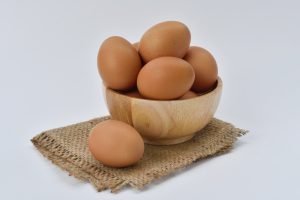 If you wake up one morning and find you can’t zip your jeans because your tummy is protruding like a basketball, you’re experiencing one of the problems of bloating. How do you eliminate or reduce bloating? The answer isn’t simple, but the ways to solve the problem certainly are. Bloating can occur almost immediately after eating, later in the day or overnight. It makes you feel uncomfortable and stuffed. The overnight type is usually water retention, while immediate bloating includes gas, liquids and solids in the digestive system. Bloating normally isn’t a serious condition, but it can be, so see your health care professional if you worry it is. Most of the time, diet and food intolerance is to blame.
If you wake up one morning and find you can’t zip your jeans because your tummy is protruding like a basketball, you’re experiencing one of the problems of bloating. How do you eliminate or reduce bloating? The answer isn’t simple, but the ways to solve the problem certainly are. Bloating can occur almost immediately after eating, later in the day or overnight. It makes you feel uncomfortable and stuffed. The overnight type is usually water retention, while immediate bloating includes gas, liquids and solids in the digestive system. Bloating normally isn’t a serious condition, but it can be, so see your health care professional if you worry it is. Most of the time, diet and food intolerance is to blame.
Start by eating slower.
When you eat fast, you often eat too much because your body doesn’t have time to tell your brain that you’re full. Slowing down your pace will help in another way. It can be a way to avoid swallowing air while you eat. Gas in the digestive system occurs because of gut bacteria, but also because of swallowed air. That can occur when you eat to fast or drink carbonated drinks. Drinking through a straw can cause gas bubbles, just as chewing gum can. If you talk while you eat, you’re also adding to bloating.
Food allergies and food intolerance can cause bloating.
Food intolerance comes from eating food that you can’t digest because you lack the enzyme to do it or an allergy. Lactose intolerance and gluten intolerance are probably two of the most common types, but fructose intolerance can also be a problem. Lactose intolerance means you should avoid dairy, while gluten means avoiding grains, like wheat. Fructose is a sugar found in fruit like apples and grapes, but also in natural sugars like honey, molasses and sorghum. Avoid foods with high-fructose corn syrup. Egg allergies often cause bloating, too.
High fiber foods are healthy, but don’t try to jump in all at once.
If you’ve recently switched to a high fiber diet or only eat fiber occasionally, it might be what’s causing your bloating. If your body isn’t used to high fiber, it almost rebels when you eat a lot and produces massive amounts of gas. Easing into it allows the healthy bacteria to increase so you don’t have the problem. Sometimes, no matter what your previous diet, some high fiber foods will cause gas. Beans are well-known for that.
- Fatty foods can also cause gas by slowing the digestion, which means your stomach will empty slower. That can contribute to bloating in some people.
- Keep a food diary noting not only what you eat but also how you feel after eating the food. It will help you identify food allergies and intolerance, while also give you more information that can help you lose weight.
- Sugar alcohols can cause digestive issues, including bloating. While the least irritating sugar alcohol is erythritol, it still can cause digestive issues just as xylitol, sorbitol and mannitol does. If you’re chewing sugarless gum or candy, it could be the culprit.
- The most prevalent bacteria in the gut can determine whether you have bloating or not. Changing the number of beneficial bacteria by eating probiotic foods can help. Kifir, sauerkraut and other fermented foods are probiotics.
For more information, contact us today at IronFit San Antonio
